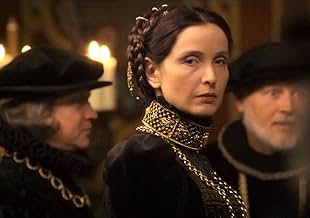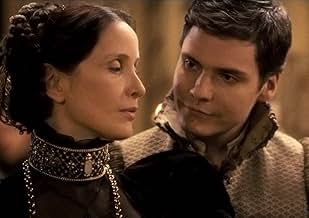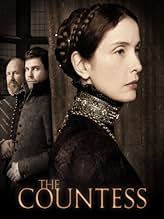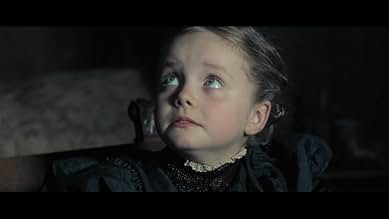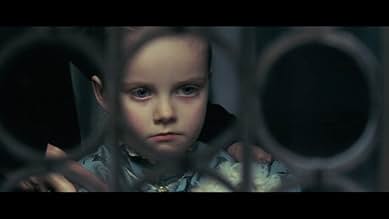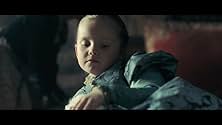VALUTAZIONE IMDb
6,2/10
8855
LA TUA VALUTAZIONE
Una contessa ungherese del XVII secolo si imbarca in un'impresa omicida, con la convinzione che bagnarsi nel sangue delle vergini conserverà la sua bellezza.Una contessa ungherese del XVII secolo si imbarca in un'impresa omicida, con la convinzione che bagnarsi nel sangue delle vergini conserverà la sua bellezza.Una contessa ungherese del XVII secolo si imbarca in un'impresa omicida, con la convinzione che bagnarsi nel sangue delle vergini conserverà la sua bellezza.
- Regia
- Sceneggiatura
- Star
- Premi
- 1 vittoria e 1 candidatura in totale
Andy Gätjen
- Miklos
- (as Andy Gatjen)
Recensioni in evidenza
Writer/director/producer/musical scorer/actress Julie Delpy brings to the screen a character from history that few know. The film is based on the true history of the woman known as The Blood Countess, but after viewing this film it is obvious that the actual figure on whom the story is based was a brilliant political mind, a woman of noble breeding who could read and write in four languages, who once widowed was able to successfully defend her lands from the warring Turks and exact control over the reigning Hungarian King Matthias. But back to the history of the character as written by Delpy. 'Countess Elizabeth Báthory de Ecsed (Báthory Erzsébet in Hungarian) (1560 - 1614) was a countess from the renowned Báthory family of Hungarian nobility. She is considered the most prolific female serial killer in history and possibly the most prolific of any gender. She and four collaborators were accused of torturing and killing hundreds of girls, with one witness attributing to them over 650 victims, though the number for which they were convicted was 80. Erzsébet herself was neither tried nor convicted. In 1610, however, she was imprisoned in the Csejte Castle, where she remained bricked in a set of rooms until her death four years later. Later writings about the case have led to legendary accounts of the Countess bathing in the blood of virgins in order to retain her youth.'
The film opens with voice over by István Thurzó (Daniel Brühl) who relates the story of his only love. We are privy to the strange behaviors of the young Erzsébet who had a sadistic streak and was at birth promised to be the bride of Ferenc Nádasdy (Charly Hübner). She became a beautiful woman and Erzsébet (Julie Delpy) married General Nádasdy, gave birth to children, and together they were the power couple of Hungary. When Nádasdy dies, Erzsébet meets and falls passionately in love with István Thurzó (Daniel Brühl), a many 19 years her junior, but Istvan's father György Thurzó (William Hurt) prevents Istvan from remaining with Erzsébet. Left alone Erzsébet remains a powerful warrior, dallies with the sadomasochistic Dominic Vizakna (Sebastian Blomberg), but fears her young lover will forget her if she ages. She discovers that the blood from virgins will restore her youth and thus begins the serial killings to support her vanity. As questions of debts owed to her by the King there is an investigation of her personal history led by György Thurzó and without proper trial she is condemned to house arrest in darkened sealed rooms in her own Csejte Castle where her fate is sealed.
The film is beautifully designed, costumed, photographed and scored, and Delpy manages to pace her story credibly and well. For this viewer there is an absence of gritty passion that would make the history more indelible: Delpy and the remainder of the cast fail to create fiery on-screen chemistry that would have brought a sense of stronger impetus to the heinous acts that occur. But as a piece of rarely known history it is a fascinating film about a strong woman of the past and the impact she had on her country ... and on legends!
Grady Harp
The film opens with voice over by István Thurzó (Daniel Brühl) who relates the story of his only love. We are privy to the strange behaviors of the young Erzsébet who had a sadistic streak and was at birth promised to be the bride of Ferenc Nádasdy (Charly Hübner). She became a beautiful woman and Erzsébet (Julie Delpy) married General Nádasdy, gave birth to children, and together they were the power couple of Hungary. When Nádasdy dies, Erzsébet meets and falls passionately in love with István Thurzó (Daniel Brühl), a many 19 years her junior, but Istvan's father György Thurzó (William Hurt) prevents Istvan from remaining with Erzsébet. Left alone Erzsébet remains a powerful warrior, dallies with the sadomasochistic Dominic Vizakna (Sebastian Blomberg), but fears her young lover will forget her if she ages. She discovers that the blood from virgins will restore her youth and thus begins the serial killings to support her vanity. As questions of debts owed to her by the King there is an investigation of her personal history led by György Thurzó and without proper trial she is condemned to house arrest in darkened sealed rooms in her own Csejte Castle where her fate is sealed.
The film is beautifully designed, costumed, photographed and scored, and Delpy manages to pace her story credibly and well. For this viewer there is an absence of gritty passion that would make the history more indelible: Delpy and the remainder of the cast fail to create fiery on-screen chemistry that would have brought a sense of stronger impetus to the heinous acts that occur. But as a piece of rarely known history it is a fascinating film about a strong woman of the past and the impact she had on her country ... and on legends!
Grady Harp
This movie rocks because it manages to be both a lavish, complex period movie and a psychological horror movie at the same time. Julie Delpy does a fantastic job in the role of a complex woman from a brutal period in European history, and her performance somehow gracefully manages to be both sympathetic and monstrous. Bathory is one of history's most prolific and sadistic mass murderers, but historians are ultimately unsure of who she really was, and to what extent she was responsible for the atrocities for which she is credited. Most agree that the whole "beauty treatment bloodbath" thing is a myth made up by later generations to spice up the story, so I was surprised that a telling supposedly rooted in fact ended up going that route, but I loved the idea of a Bathory who is a real person and not just a 2-dimensional fiend. Great sets, costumes, and performances from a well-written script make The Countess an engaging and informative portrait of a woman whose vanity and blood lust have become the stuff of legend.
I really wanted to like this. Based on the true story of 17th century Countess Bathory, who grew obsessed with retaining her youth, and decided the best way to do this was by bathing in the blood of virgins. What could have been a disturbing descent into madness turns out to be a dull by the numbers bio-pic/period piece.
Julie Delpy does an alright job in the titular role, but the departure from her usual romantic roles doesn't really work, as Delpy just seems like she's on auto-pilot throughout most of the film. The script, written by Delpy, treats the Countess as some sort of feminist pioneer, and at other times, shows her to be a monster. The movie wants to have it both ways, but in the end it it just seems really confused and tiresome.
Julie Delpy does an alright job in the titular role, but the departure from her usual romantic roles doesn't really work, as Delpy just seems like she's on auto-pilot throughout most of the film. The script, written by Delpy, treats the Countess as some sort of feminist pioneer, and at other times, shows her to be a monster. The movie wants to have it both ways, but in the end it it just seems really confused and tiresome.
I haven't seen the film yet, I was thinking of seeing it this week, but given some of the things I've read in the reviews, I may not bother. The story recounted in the film is NOT a true story at all. Countess Elizabeth Bathory existed and she was indeed charged with a number of supposed murders, but the charges were never properly proved. In fact no evidence was properly presented - her 'trial' was a politically motivated set-up. She was an extremely rich and powerful woman living at a time when in most societies, but especially Eastern European ones, wealthy and powerful women were hugely resented by their male counterparts.
Once she was widowed Countess Bathory chose not to remarry as she did not want another man to take control of her lands. She wanted to rule her estates herself - and she was a very capable ruler. Unfortunately powerful men in Hungary (and the Austro-Hungarian Empire) were greedy for her lands. They could not dispossess her legally, so they hatched a plot to have her charged with terrible crimes. Her servants were tortured and forced to accuse her, however, no credible evidence was ever presented. It was enough however, for her lands to be confiscated.
As for punishment, she was NOT bricked up in a room and fed through a hole in the wall. That is fantasy. She was confined to a few rooms in one of her castles, a kind of house arrest. Sadly films like this perpetuate the myth and falsehoods about a woman who, although tough and sometimes hard on her servants, was never guilty of the horrendous crimes of which she has been accused. I am so sick and tired of seeing history re-written and fabricated that I probably won't go and see it now - and I would warn anyone who thinks they are going to see something 'historical' that it just isn't.
Once she was widowed Countess Bathory chose not to remarry as she did not want another man to take control of her lands. She wanted to rule her estates herself - and she was a very capable ruler. Unfortunately powerful men in Hungary (and the Austro-Hungarian Empire) were greedy for her lands. They could not dispossess her legally, so they hatched a plot to have her charged with terrible crimes. Her servants were tortured and forced to accuse her, however, no credible evidence was ever presented. It was enough however, for her lands to be confiscated.
As for punishment, she was NOT bricked up in a room and fed through a hole in the wall. That is fantasy. She was confined to a few rooms in one of her castles, a kind of house arrest. Sadly films like this perpetuate the myth and falsehoods about a woman who, although tough and sometimes hard on her servants, was never guilty of the horrendous crimes of which she has been accused. I am so sick and tired of seeing history re-written and fabricated that I probably won't go and see it now - and I would warn anyone who thinks they are going to see something 'historical' that it just isn't.
Well, actually, in the Little Carpathians, apparently, which are not part of Transylvania, or so Wikipedia tells me.
I really enjoyed this film (at home on pay-per-view)though I think it is intended for a pretty narrow audience. As others have noted, the dialogue is amazingly stilted (very literary, rather like a French novel of the 17th or 18th century) and delivered in near-monotone. I kept feeling that the whole movie had been dubbed into English. On the other hand, I found the acting very fine, and I admired the insistence on presenting these characters as not at all like you, me, or the folks in the latest TV drama. The Countess in particular is a strange, unique portrait--her piety, her desire for amorous adventure, her pride, her intelligence. And that's before you get to the blood-of-virgins part.
The film proposes that what we are seeing before our eyes is not the truth about the Countess. We are watching a fantasy of a noblewoman enacting a tale "told by the victors"--by the men who were enriched by her downfall and relieved, too, to be rid of the very possibility of an intelligent woman. The tale is told, too, by the peasants and others whose sons are fighting in her army. Yet the man who questions the gory story is her lover, and he too may be deceived. There is no simple answer to the question, what really happened?--no resolution.
In short, it's an intellectual (and visual) treat, but it won't affect your blood sugar.
I really enjoyed this film (at home on pay-per-view)though I think it is intended for a pretty narrow audience. As others have noted, the dialogue is amazingly stilted (very literary, rather like a French novel of the 17th or 18th century) and delivered in near-monotone. I kept feeling that the whole movie had been dubbed into English. On the other hand, I found the acting very fine, and I admired the insistence on presenting these characters as not at all like you, me, or the folks in the latest TV drama. The Countess in particular is a strange, unique portrait--her piety, her desire for amorous adventure, her pride, her intelligence. And that's before you get to the blood-of-virgins part.
The film proposes that what we are seeing before our eyes is not the truth about the Countess. We are watching a fantasy of a noblewoman enacting a tale "told by the victors"--by the men who were enriched by her downfall and relieved, too, to be rid of the very possibility of an intelligent woman. The tale is told, too, by the peasants and others whose sons are fighting in her army. Yet the man who questions the gory story is her lover, and he too may be deceived. There is no simple answer to the question, what really happened?--no resolution.
In short, it's an intellectual (and visual) treat, but it won't affect your blood sugar.
Lo sapevi?
- QuizThe real Elizabeth Báthory has been speculated (such as by author Raymond T. McNally) as being Bram Stoker's main influence for his famous character Dracula, rather than or along with the real Vlad Tepes. Nosferatu - Il vampiro (1922) (an unofficial adaptation of "Dracula") was filmed at Báthory's historical resident and later prison, the Cachtice Castle, which appears in its final shot.
- BlooperAt about 1h15m, the fifth book on the shelf is the "Dictionnaire De Boyer". Abel Boyer did write a French-English dictionary, but he was born in 1664 and Countess Báthory died in 1614.
- Citazioni
Gyorgy Thurzo: Love is a myth, to keep the minds of young peasants and virgins occupied with a dream.
- ConnessioniVersion of I vampiri (1957)
- Colonne sonoreCouranta VI
Solinger Streichquartett
Written by Isaak Pesch
From the album "Telemusik"
© & ® Peter Lamprecht
Courtesy of Solinger Streichquartett/Peter Lamprecht
I più visti
Accedi per valutare e creare un elenco di titoli salvati per ottenere consigli personalizzati
- How long is The Countess?Powered by Alexa
Dettagli
- Data di uscita
- Paesi di origine
- Siti ufficiali
- Lingue
- Celebre anche come
- The Countess
- Luoghi delle riprese
- Burg Kriebstein, Kriebstein, Saxony, Germania(exteriors: Countess Bathory's castle)
- Aziende produttrici
- Vedi altri crediti dell’azienda su IMDbPro
Botteghino
- Budget
- 5.700.000 € (previsto)
- Lordo in tutto il mondo
- 784.522 USD
- Tempo di esecuzione1 ora 38 minuti
- Colore
- Mix di suoni
- Proporzioni
- 2.35 : 1
Contribuisci a questa pagina
Suggerisci una modifica o aggiungi i contenuti mancanti

Divario superiore
By what name was La Contessa (2009) officially released in Canada in English?
Rispondi
